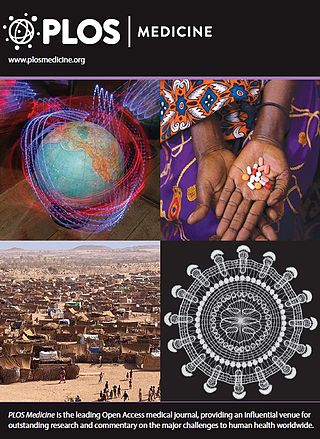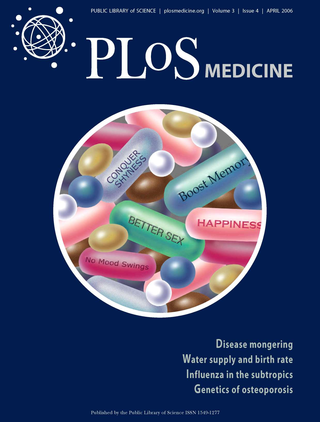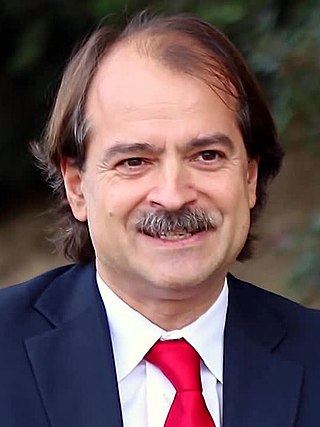A health system, health care system or healthcare system is an organization of people, institutions, and resources that delivers health care services to meet the health needs of target populations.
Orthomolecular medicine is a form of alternative medicine that aims to maintain human health through nutritional supplementation. The concept builds on the idea of an optimal nutritional environment in the body and suggests that diseases reflect deficiencies in this environment. Treatment for disease, according to this view, involves attempts to correct "imbalances or deficiencies based on individual biochemistry" by use of substances such as vitamins, minerals, amino acids, trace elements and fatty acids. The notions behind orthomolecular medicine are not supported by sound medical evidence, and the therapy is not effective for chronic disease prevention; even the validity of calling the orthomolecular approach a form of medicine has been questioned since the 1970s.

PLOS Medicine is a peer-reviewed weekly medical journal covering the full spectrum of the medical sciences. It began operation on October 19, 2004, as the second journal of the Public Library of Science (PLOS), a non-profit open access publisher. All content in PLOS Medicine is published under the Creative Commons "by-attribution" license. To fund the journal, the publication's business model requires in most cases that authors pay publication fees. The journal was published online and in a printed format until 2005 and is now only published online. The journal's acting chief editor is Clare Stone, who replaced the previous chief editor, Larry Peiperl, in 2018.

Disease mongering is a pejorative term for the practice of widening the diagnostic boundaries of illnesses and aggressively promoting their public awareness in order to expand the markets for treatment.
A hierarchy of evidence, comprising levels of evidence (LOEs), that is, evidence levels (ELs), is a heuristic used to rank the relative strength of results obtained from experimental research, especially medical research. There is broad agreement on the relative strength of large-scale, epidemiological studies. More than 80 different hierarchies have been proposed for assessing medical evidence. The design of the study and the endpoints measured affect the strength of the evidence. In clinical research, the best evidence for treatment efficacy is mainly from meta-analyses of randomized controlled trials (RCTs). Systematic reviews of completed, high-quality randomized controlled trials – such as those published by the Cochrane Collaboration – rank the same as systematic review of completed high-quality observational studies in regard to the study of side effects. Evidence hierarchies are often applied in evidence-based practices and are integral to evidence-based medicine (EBM).
Thomas William "Tom" Ferguson was an American medical doctor, educator, and author. He was an early advocate for patient empowerment, urging patients to educate themselves, to assume control of their own health care, and to use the Internet as a way of accomplishing those goals.

Medical literature is the scientific literature of medicine: articles in journals and texts in books devoted to the field of medicine. Many references to the medical literature include the health care literature generally, including that of dentistry, veterinary medicine, pharmacy, nursing, and the allied health professions.
David Lawrence Sackett was an American-Canadian physician and a pioneer in evidence-based medicine. He is known as one of the fathers of Evidence-Based Medicine. He founded the first department of clinical epidemiology in Canada at McMaster University, and the Oxford Centre for Evidence-Based Medicine. He is well known for his textbooks Clinical Epidemiology and Evidence-Based Medicine.
Consolidated Standards of Reporting Trials (CONSORT) encompasses various initiatives developed by the CONSORT Group to alleviate the problems arising from inadequate reporting of randomized controlled trials. It is part of the larger EQUATOR Network initiative to enhance the transparency and accuracy of reporting in research.
A clinical prediction rule or clinical probability assessment specifies how to use medical signs, symptoms, and other findings to estimate the probability of a specific disease or clinical outcome.
The Grand Challenges in Global Health (GCGH) is a research initiative launched by the Bill & Melinda Gates Foundation in search of solutions to health problems in the developing world. Fifteen challenges are categorized in groups among seven stated goals plus an eighth group for family health. The disciplines involved include immunology, microbiology, genetics, molecular biology and cellular biology, entomology, agricultural sciences, clinical sciences, epidemiology, population and behavioral sciences, ecology, and evolutionary biology.

John P. A. Ioannidis is a Greek-American physician-scientist, writer and Stanford University professor who has made contributions to evidence-based medicine, epidemiology, and clinical research. Ioannidis studies scientific research itself, meta-research primarily in clinical medicine and the social sciences.

Medical journalism is news reporting of medical news and features. Medical journalism is diverse, and reflects its audience. The main division is into (1) medical journalism for the general public, which includes medical coverage in general news publications and in specialty medical publications, and (2) medical journalism for doctors and other professionals, which often appears in peer-reviewed journals. The accuracy of medical journalism varies widely. Reviews of mass media publications have graded most stories unsatisfactory, although there were examples of excellence. Other reviews have found that most errors in mass media publications were the result of repeating errors in the original journal articles or their press releases. Some web sites, such as Columbia Journalism Review and Hippocrates Med Review, publish and review medical journalism.
A medical journal is a peer-reviewed scientific journal that communicates medical information to physicians, other health professionals. Journals that cover many medical specialties are sometimes called general medical journals.
PharmedOut (PhO) is a Georgetown University Medical Center project founded in 2006. It is directed by Adriane Fugh-Berman. The stated mission of the organization is to advance evidence-based prescribing and educate healthcare professionals about pharmaceutical marketing practices.
Unnecessary health care is health care provided with a higher volume or cost than is appropriate. In the United States, where health care costs are the highest as a percentage of GDP, overuse was the predominant factor in its expense, accounting for about a third of its health care spending in 2012.

Devi Elizabeth Nampiaparampil is an American physician and researcher who specializes in preventing and treating chronic pain. She performs X-ray-guided invasive spinal procedures for pain, teaches medical students and trainees, comments on medical issues for various platforms, and appears on news and talk shows. She has appeared on the daytime soap opera General Hospital. Dr. Nampiaparampil also ran as for New York City Public Advocate in the November 2021 general election.
The Physician Payments Sunshine Act is a 2010 United States healthcare law to increase transparency of financial relationships between health care providers and pharmaceutical or medical device manufacturers.
Isabelle Boutron is a professor of epidemiology at the Université Paris Cité and head of the INSERM- METHODS team within the Centre of Research in Epidemiology and Statistics (CRESS). She was originally trained in rheumatology and later switched to a career in epidemiology and public health. She is also deputy director of the French EQUATOR Centre, member of the SPIRIT-CONSORT executive committee, director of Cochrane France and co-convenor of the Bias Methods group of the Cochrane Collaboration.
Madhukar Pai is an Indian medical doctor, academic, advocate, writer, and university professor. Pai's work is around global health, specifically advocacy for better treatment for tuberculosis with a focus on South Africa and India. Pai is the inaugural Chair of the Department of Global and Public Health in the School of Population and Global Health and holds a Canada Research Chair in Epidemiology and Global Health at McGill University.





